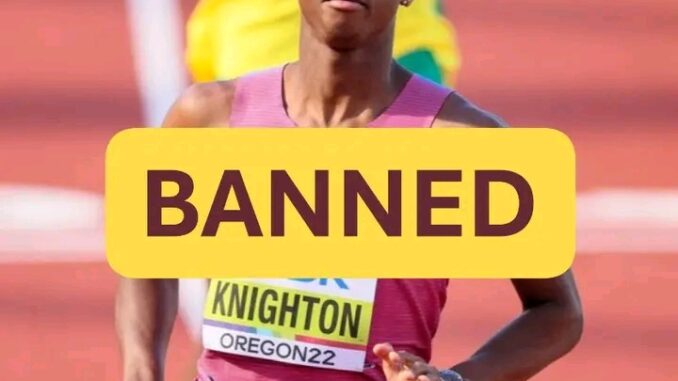
BREAKING: Erriyon Knighton handed four-year doping ban after appeal by World Anti‑Doping Agency and Athletics Integrity Unit..
Lausanne, Switzerland – 12 September 2025 — Two major global sports-governing bodies, World Athletics (WA) and the World Anti-Doping Agency (WADA), successfully appealed a domestic decision and secured a four-year ban for U.S. sprinter Erriyon Knighton after a doping violation.
What happened
On 26 March 2024, Knighton provided an out-of-competition urine sample in Gainesville, Florida. That analysis revealed the presence of epitrenbolone, a metabolite of the anabolic steroid trenbolone, which is prohibited under the WADA Prohibited List (S.1.1 / Anabolic Androgenic Steroids).
The United States Anti-Doping Agency (USADA) charged Knighton with an Anti-Doping Rule Violation (ADRV).
In June 2024, an independent arbitration tribunal ruled in Knighton’s favour, concluding he bore no fault or negligence, accepting his explanation that the result derived from consumption of contaminated meat (oxtail) and thus imposed no ineligibility period.
In August 2024, WA, via the Athletics Integrity Unit (AIU), and WADA lodged appeals with the Court of Arbitration for Sport (CAS) seeking to overturn the ruling and impose a four-year ban.
On 12 September 2025, CAS issued its decision: the appeals by WA and WADA were partially upheld, the earlier tribunal’s decision set aside, and Knighton was declared ineligible for four years. The ban is effective from notification of the award, with credit given for his provisional suspension served between 12 April and 19 June 2024. His results from 26 March 2024 to 12 April 2024 are disqualified.
Why the appeal succeeded
The key issue was Knighton’s defence: ingestion of an oxtail dish contaminated with trenbolone. CAS found the defence did not meet the required proof-of-source standard. Specifically:
> “There is no proof that would support the conclusion that oxtail imported into the USA would be likely to contain trenbolone residues at the level required to have caused the Athlete’s Adverse Analytical Finding.”
Expert evidence presented by WADA showed that the concentrations found in the oxtail sample (0.1 ng/g) were far too low to explain the athlete’s sample, and that the contamination scenario was statistically highly unlikely.
Under Article 10.2 of the WADA Code (via WA’s rules) the default ineligibility for an ADRV involving a non-specified substance (such as trenbolone) is four years, unless the athlete can show “no fault or negligence”. The panel found Knighton failed to do so.
Implications of the ban
The four-year ban means Knighton is ineligible to compete until July 2029, when the provisional suspension credit ends.
Importantly, this ruling prevents him from participating in the 2028 Olympic Games in Los Angeles.
Not all his results were stripped: only those from 26 March to 12 April 2024 are disqualified. Results from 12 June 2024 onwards (after his provisional suspension) were not fully annulled, as per the CAS decision.
Broader context – tensions with USADA
The case highlights friction between USADA (the U.S. national anti-doping body) and global authorities. USADA had accepted the “no fault” defence and cleared Knighton initially.
WADA and the AIU challenged this domestic outcome, asserting that the USADA tribunal’s standard of proof was inadequate. Their appeal succeeded.
USADA CEO Travis Tygart responded by pointing to what he described as inconsistent global rule-making, particularly around contamination defences, and critiqued WADA for being slow to fix rules.
What’s next
Knighton may seek recourse through the Swiss Federal Tribunal (the next-level review body for CAS awards), though no public indication has been made yet.
The case may prompt reconsideration of rules around contamination defences, particularly substances known to arise from livestock/farming, such as trenbolone.
For the sport: it sends a clear message that contamination defences must meet very high standards of proof — and global bodies are willing to overrule national-level decisions they deem too lenient.
Summary
Erriyon Knighton’s case illustrates the complex interplay of national and global anti-doping governance. Although USADA initially cleared him, the global bodies (WADA & WA/AIU) appealed, bringing the matter to CAS. The outcome: a four-year ban, underscoring that athletes must meet strict standards to avoid sanction — and that national bodies’ decisions may be overturned when global oversight judges them insufficient.
Leave a Reply